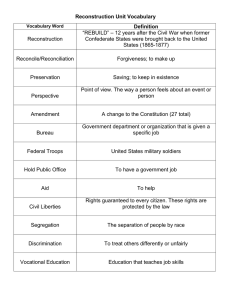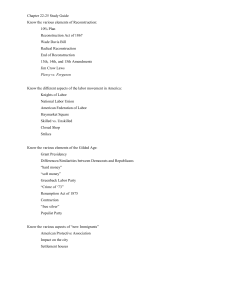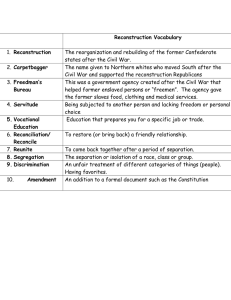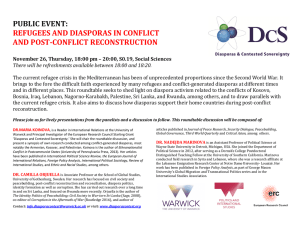GRADUATE COURSE PROPOSAL OR REVISION, Cover Sheet
advertisement
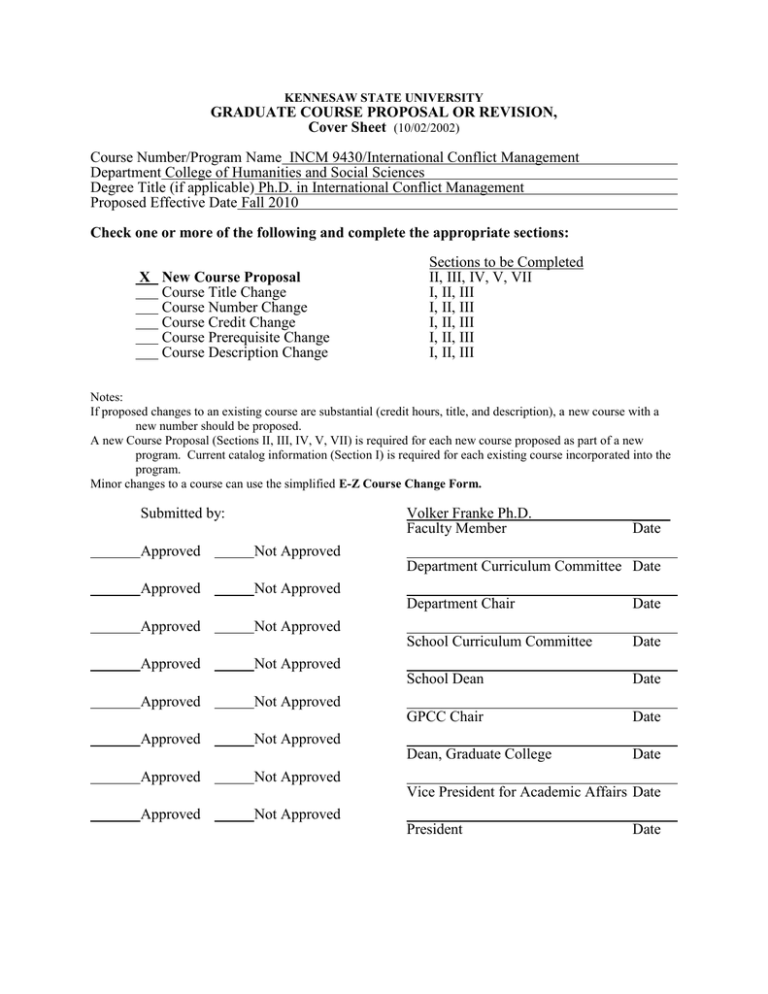
KENNESAW STATE UNIVERSITY GRADUATE COURSE PROPOSAL OR REVISION, Cover Sheet (10/02/2002) Course Number/Program Name INCM 9430/International Conflict Management Department College of Humanities and Social Sciences Degree Title (if applicable) Ph.D. in International Conflict Management Proposed Effective Date Fall 2010 Check one or more of the following and complete the appropriate sections: X New Course Proposal Course Title Change Course Number Change Course Credit Change Course Prerequisite Change Course Description Change Sections to be Completed II, III, IV, V, VII I, II, III I, II, III I, II, III I, II, III I, II, III Notes: If proposed changes to an existing course are substantial (credit hours, title, and description), a new course with a new number should be proposed. A new Course Proposal (Sections II, III, IV, V, VII) is required for each new course proposed as part of a new program. Current catalog information (Section I) is required for each existing course incorporated into the program. Minor changes to a course can use the simplified E-Z Course Change Form. Submitted by: Approved Volker Franke Ph.D. Faculty Member _____ Date Not Approved Department Curriculum Committee Date Approved Approved Approved Approved Approved Approved Not Approved Department Chair Date School Curriculum Committee Date School Dean Date GPCC Chair Date Dean, Graduate College Date Not Approved Not Approved Not Approved Not Approved Not Approved Vice President for Academic Affairs Date Approved Not Approved President Date KENNESAW STATE UNIVERSITY GRADUATE COURSE/CONCENTRATION/PROGRAM CHANGE I. Current Information (Fill in for changes) Page Number in Current Catalog Course Prefix and Number Course Title Credit Hours Prerequisites Description (or Current Degree Requirements) II. Proposed Information (Fill in for changes and new courses) Course Prefix and Number INCM 9430_____________________________ Course Title Post-Agreement Reconstruction Credit Hours 3-0-3 Prerequisites INCM 9001, 9002 and 9003 Description (or Proposed Degree Requirements) This course provides an opportunity to examine emerging research on the impact of peace agreements on the conflict process. Of particular interest will be the role for development economics, including programs to alleviate poverty like micro-credit, as well as the corruption of prospects for sustaining the ceasefire and building peace. External and internal influences are studied, such as donor fatigue, media attention, civic education, and the reintegration of participants of the conflict into civil society. Students will compare conflict mitigation processes and assess their effectiveness for the context in which they were utilized. III. Justification Post Construction Research will compare conflict mitigation processes and assess their effectiveness for the context in which they were utilized. Examining and reconstructing agreements post their effective date plays a substantial role in conflict resolution. The intent of an elective is to allow students to have maximum flexibility in the selection of courses to build skills and knowledge needed in their dissertation work. IV. Additional Information (for New Courses only) Instructor: Maia Hallward, Ph.D. Text: Prerequisites: INCM 9001, 9002 and 9003 Objectives: Define concept of post-agreement reconstruction and related terms like state-building Discuss reasons why approximately 40% of all wars return to war within five years of peace Compare and contrast approaches to making and keeping the “peace” Evaluate how to define and measure “success” in post-agreement reconstruction, peacebuilding, state building efforts Identify key issues in conflict-affected contexts and discuss methods for addressing them Apply course concepts to a case study by developing a conflict sensitive proposal for reconstruction in a defined sector Knowledgeably participate in intellectual debate surrounding various models of postconflict transition and interventions in different sectors (eg security, elections, economic development) Instructional Method -Class discussion Method of Evaluation -Case study, policy proposal, exam, and participation V. Resources and Funding Required (New Courses only) Resource Amount Faculty Other Personnel Equipment Supplies Travel New Books New Journals Other (Specify) TOTAL Funding Required Beyond Normal Departmental Growth The costs are included in the overall cost for the new Ph.D. program and are not separate. VI. COURSE MASTER FORM This form will be completed by the requesting department and will be sent to the Office of the Registrar once the course has been approved by the Office of the President. The form is required for all new courses. DISCIPLINE COURSE NUMBER COURSE TITLE FOR LABEL (Note: Limit 16 spaces) CLASS-LAB-CREDIT HOURS Approval, Effective Term Grades Allowed (Regular or S/U) If course used to satisfy CPC, what areas? Learning Support Programs courses which are required as prerequisites INCM 9430 Post-Agreement Reconstruction 3-0-3 Fall 2010 Regular APPROVED: ________________________________________________ Vice President for Academic Affairs or Designee __ VII Attach Syllabus INCM 9430: Post-Agreement Reconstruction Ph.D. Program in International Conflict Management Kennesaw State University I. Professor Contact Information Dr. Maia Hallward Office: SO 5069 mhallwar@kennesaw.edu 678-797-2155 Dept of Political Science & Int’l Affairs 1000 Chastain Rd, MD 2205 Kennesaw, GA 30 II. Course Pre-requisites, Co-requisites, and/or Other Restrictions INCM 9001, 9002 and 9003 III. Course Description This course provides an opportunity to examine emerging research on the impact of peace agreements on the conflict process. Of particular interest will be the role for development economics, including programs to alleviate poverty like micro-credit, as well as the corruption of prospects for sustaining the ceasefire and building peace. External and internal influences are studied, such as donor fatigue, media attention, civic education, and the reintegration of participants of the conflict into civil society. Students will compare conflict mitigation processes and assess their effectiveness for the context in which they were utilized. IV. Student Learning Objectives/Outcomes Define concept of post-agreement reconstruction and related terms like state-building Discuss reasons why approximately 40% of all wars return to war within five years of peace Compare and contrast approaches to making and keeping the “peace” Evaluate how to define and measure “success” in post-agreement reconstruction, peacebuilding, state building efforts Identify key issues in conflict-affected contexts and discuss methods for addressing them Apply course concepts to a case study by developing a conflict sensitive proposal for reconstruction in a defined sector Knowledgeably participate in intellectual debate surrounding various models of post-conflict transition and interventions in different sectors (eg security, elections, economic development) V. Textbooks and Materials -Paris, Roland, and Timothy D. Sisk. 2009. The Dilemmas of Statebuilding: Confronting the contradictions of postwar peace operations. 1st ed. New York: Routledge. -Dobbins, James et al. 2007. The Beginner’s Guide to Nation-Building. RAND Corporation. Available for free download at http://www.rand.org/pubs/monographs/2007/RAND_MG557.pdf -Rotberg, Robert, ed (2003). When States Fail: Causes and Consequences. Princeton University Press -Extensive use will be made of organizational reports available online and academic articles available through library databases and/or course GeorgiaView Vista site. VI. Course Outline: Week 1: Introduction and Definition of Terms - Rotberg, Chapter 1. The Failure and Collapse of Nation-States - Paris & Sisk, Ch. 1 - Dobbins, The Beginner’s Guide to Nation-Building. Foreword & Summary Week 2: Approaches to Understanding and Addressing Conflict - - Dudouet, Veronique (2006). Transitions from Violence to Peace: Revisiting Analysis and Intervention in Conflict Transformation. Berghof Research Center for Constructive Conflict Management http://www.berghof-center.org/uploads/download/br15e.pdf Humanitarian Policy and Conflict Research (HPCR) - Peacebuilding Initiative http://www.peacebuildinginitiative.org, “What is Peacebuilding?” http://www.conflictsensitivity.org/node/8 - Read Chapter 1, from the Conflict-Sensitive Approaches to Development, Humanitarian Assistance and Peacebuilding: A Resource Pack. McCandless, Erin, 2007, “Synopsis of Major concepts”, (85-105) in McCandless, Erin and Abdul Karim Bangura, with Mary E. King and Ebrima Sall. Peace Research for Africa: Critical Essays on Methodology. Geneva: UN University for Peace. http://www.africa.upeace.org/resources.cfm Week 3: Conflict Assessment and Analysis - USAID (2005). Conducting a Conflict Assessment: A Framework for Analysis and Program Development. http://rmportal.net/library/content/tools/conflict-assessment-and-managementtools/higherlevel_conflictassmt/view - Menkhaus, Ken (2004) “Impact Assessment in Post-Conflict Peacebuilding”. Interpeace. http://www.interpeace.org/pdfs/Publications_%28Pdf%29/Current_Reports/Challenges_in_peacebuildi ng_impact_assessment.pdf - International Alert, et al, Conflict-Sensitive Approaches to Development, Humanitarian Assistance and Peacebuilding: A Resource Pack. Read Chapter 2. http://www.conflictsensitivity.org/node/8 Week 4: State building and Reconstruction: Definitions, Contexts, Challenges - Rotberg, Chs. 3 & 7 (The Global-Local Politics of State Decay; Forming States after Failure); Paris & Sisk, Ch 2: The peacebuilder’s contract: how external statebuilding reinforces weak statehood Shepherd, Laura J. (June 2008 ). Power and Authority in the Production of United Nations Security Council Resolution 1325. International Studies Quarterly 52:2 (p 383-404) Patrick, Stewart. (2007).Failed States and Global Security: Empirical Questions and Policy Dilemmas. International Studies Review 9:4, pp. 644-662. Week 5: Frameworks and Actors involved in post-agreement reconstruction - Paris & Sisk, Ch. 3: Understanding the ‘coordination problem’ in postwar statebuilding - Dobbins, Ch.1 (Preparing for Nation-Building) and Ch. 5 (Humanitarian Relief) - Karin von Hippel (2006). Consolidating Peace in Sudan: An Action Strategy. CSIS Report available at http://csis.org/files/media/csis/pubs/0603_sudanfinal2.pdf - Roland Paris, “International Peacebuilding and the ‘mission civilisatrice’,” Review of International Studies, 28 (2003), 637-656. - Béatrice Pouligny, “Civil Society and Post-Conflict Peace Building: Ambiguities of International Programs Aimed at Building ‘New Societies’,” Security Dialogue, 36:4 (December 2005), 495-510. - Amy Scott, “The United Nations Peacebuilding Commission: An Early Assessment”. Journal of Peacebuilding and Development 4:2 (2008), pp. 7-19. - Structuring Public Participation in Official Peace Processes. Afghanistan: Pathways to Peace. 3D Security Briefing 4 (December 2009). http://www.3dsecurity.org/sites/3dsecurity.org/files/P2P%20Structuring%20public%20processes.pdf (browse around this section of the website) Week 6: Governance and Participation - Rotberg, Chs. 10-11 & 13 (Building Effective Trust; Civil Society and the Reconstruction of Failed States; Transforming the Institutions of War: Elections and the Reconstruction of Failed States) - Paris & Sisk, Chs. 8-9 (Postwar constitution building; Pathways of the political: electoral processes after civil war) - -Dobbins, James. 2007. The Beginner’s Guide to Nation-Building. RAND Corporation. Ch. 6. (Governance) and Ch. 8 (Democratization) Week 7: Transitional Justice, Reconciliation and Rule of Law - Rotberg, Ch. 9 (Establishing the Rule of Law) RAND, Ch. 4, Rule of Law Roman David & Susanne Choi (June 2006). Forgiveness and Transitional Justice in the Czech Republic. Journal of Conflict Resolution 50:3, pp. 3390367 Kimberly Theidon (2006). Justice in Transition: The Micropolitics of Reconciliation in Postwar Peru. Journal of Conflict Resolution 50:3, pp. 433-457 Marek Kiminski and Monika Nalepa (2006). Judging Transitional Justice: A New Criterion for Evaluating Truth Revelations. Journal of Conflict Resolution 50:3, pp. 383-408. Jay Vora and Erika Vora (2004). The Effectiveness of South Africa’s Truth and Reconciliation Commission: Perceptions of Xhosa, Afrikaner and English South Africans. Journal of Black Studies 34:3, pp. 301-322. Week 8: Security Sector Issues - - - Fleischner et al (2009). Homebound Security: Migrant Support for Improved Public Security Dobbins, James. 2007. The Beginner's Guide to Nation-Building. RAND Corporation. Chapters 2 (Military) and 3 (Police) Paris and Sisk, Chapter 4: Edelstein, David M. 2009. “Foreign Militaries, Sustainable Institutions, and Postwar Statebuilding.” In The Dilemmas of Statebuilding: Confronting the Contradictions of Postwar Peace operations, eds. Roland Paris and Timothy D. Sisk. New York: Routledge, p. 81-103. Paris and Sisk, Chapter 5: Avant, Deborah. 2009. “Making Peacemakers out of Spoilers: International Organizations, Private Military Training, and Statebuilding After War.” In The Dilemmas of Statebuilding: Confronting the Contradictions of Postwar Peace operations, eds. Roland Paris and Timothy D. Sisk. New York: Routledge, p. 104-126. Rotberg, Ch. 8 (Disarmament, Demobilization and Reintegration) Week 9 :Economic Development and Growth - World Bank, 2005, “Toward a Conflict – Sensitive Poverty Reduction Strategy: Lessons from a Retrospective Analysis”, Washington DC: World Bank. (Read Full report) - Muscat, Robert, 2005, “Reviving Agriculture in the Aftermath of Violent Conflict”, JPD 2:2. * This is a superb example of the application of a conflict/peace lens to sectoral policy. Rotberg, Ch. 12 (Restoring Economic Functioning in Failed States) & Ch. 4 (The Economic Correlates of State Failure) - Paris & Sisk Chs. 6-7 (Trajectories of Accumulation through War and Peace; The superficiality of statebuilding Cambodia) - Dobbins, Chs 7 & 9 (Economic Stabliization & Development) - Kaysie Brown (2006). War Economies and Post-conflict Peacebuilding: Identifying a Weak Link. Journal of Peacebuilding and Development 3:1, pp. 6-19 - Erin McCandless and Tyler Christie (2006). Beyond Sanctions: Evolving Integrated Strategies to Address Natural Resource-based Challengges in Post-conflict Liberia. Journal of Peacebuilding and Development 3:1, pp. 30-35. Week 10: Case Study: Liberia (Civil War) **MIDTERM DUE AT THE BEGINNING OF CLASS** - Government of Liberia, Poverty Reduction Strategy, 2008. (Selections, Chapters 1, 2, 5, Annex 2, and 1 chapter closest to what you will focus on in your case) http://www.preventionweb.net/english/policies/v.php?id=9357&cid=98 - McCandless, 2008 “Integrated Approaches to Peacebuilding in Transitional Settings: Lessons from Liberia”, ISS Paper, South Africa: Institute for Security Studies. http://www.issafrica.org/index.php?link_id=14&slink_id=5915&link_type=12&slink_type=12&tmpl_i d=3 - World Bank, 2005, “Toward a Conflict – Sensitive Poverty Reduction Strategy: Lessons from a Retrospective Analysis”, Washington DC: World Bank. (Read Executive Summary) - http://wwwwds.worldbank.org/external/default/main?pagePK=64193027&piPK=64187937&theSitePK=523679& menuPK=64187510&searchMenuPK=64187283&siteName=WDS&entityID=000160016_200507141 60728 Week 11: Case Study: Afghanistan and Iraq (Foreign Military Intervention) - Paris & Sisk, Ch. 10: The dangers of a tight embrace: externally assisted statebuildng in Afghanistan - Christopher Cramer and Jonathan Goodhand, “Try Again, Fail Again, Fail Better? War, the State and the ‘Post-Conflict’ Challenge in Afghanistan,” in Jennifer Milliken, ed., State Failure, Collapse and Reconstruction, 131-155. - Toby Dodge, “Iraq: the Contradictions of Exogenous State-building in Historical Perspective, Third World Quarterly, 27:1 (2006), 187-200. - Shiza Shahid (2009). Engaging Regional Players in Afghanistan: Threats and Opportunities. Summary Paper by CSIS Post Conflict Reconstruction Project. http://csis.org/files/publication/091124_afghan_players_0.pdf - Wolfram Lacher (2007). Iraq: Exception to, or Epitome of Contemporary Post-conflict Reconstruction? International Peacekeeping 14:2, pp. 237-250. - Valentine Moghadam (2005). Peacebuilding and Reconstruction with Women: Reflections on Afghanistan, Iraq and Palestine. Development 48:3, pp. 63-72. - Additional contemporary readings TBD From 3D Security and other sources Week 12: Kosovo (Seeking autonomy) - Paris & Sisk, Ch. 10: Dilemmas of Promoting Local Ownership: The Case of Postwar Kosovo - World Bank Group Response to Post Conflict Reconstruction in Kosovo. http://lnweb90.worldbank.org/eca/eca.nsf/d1e666886eb626e2852567d100165168/f1a77481d37665568 525688f0078955a?OpenDocument - Jens Sorensen (2006). The Shadow Economy, War and State Building: Social Transformation and Restratification in an Illiberal Economy (Serbia and Kosovo). Journal of Contemporary European Studies 14:3, pp. 317-351. - Oisin Tansey (2009). Kosovo: Independence and Tutelage. Journal of Democracy 20:2, pp. 153-166 - Niels van Willingen. 2009. EU Conflict Management and international administration in Bosnia & Herzegovina and Kosovo. Paper presented at ISA convention 14-18 February 2009. Available for download at: http://convention2.allacademic.com/one/isa/isa09/index.php?click_key=1&PHPSESSID=171d784318 96dd901104b9c38ff1880f - Lesley Abdela (2003). Kosovo: missed opportunities, lessons for the future. Development in Practice 13:2&3, pp 208-216. - Jasmina Husanovic (2000). ‘Post-Conflict’ Kosovo: An Anatomy Lesson in the Ethics/Politics of Human Rights. International Journal of Human Rights 4: ¾, pp. 263-281. - Report of the Secretary-General on the United Nations Interim Administration Mission in Kosovo (September 2009). Available at http://www.unmikonline.org/UNMIKONLINE2009/misc/docs/unsg_rep_300909.pdf Week 13: Challenges and Dilemmas in post-agreement reconstruction - Paris & Sisk, Chs. 12-13 (Statebuilding after Afghanistan and Iraq; Confronting the Contradictions) - Rotberg, Ch. 14 (Let them Fail: State Failure in Theory and Practice implications for policy) - RAND, Ch. 10 (The Cost of Nation-Building) Week 14: Student Presentations on Case Studies; **FINAL CASE STUDY PAPERS DUE** Week 15: Student Presentations on Case Studies VII. Grading Policy Grades will be calculated as follows: Classroom Participation (25%) includes: - Informed contribution to class discussions; constructive critique of readings Day as ‘seminar leader’ with responsibility to open and guide class discussion (more directions to come) - Presentation of final case study findings Mid-term exam (25%): - Take home, essay style format focusing on the conceptual frameworks underpinning strategies for post-agreement policy making and programming Analytical case study and policy proposal (50%) includes: - - Conflict analysis (20%) Literature review (on case and relevant approaches, at least 10 articles) (20%) Analysis and critique of past/current practice/policy approaches (should address issues of conflict sensitivity, etc) (30%) - Recommendations for policy/practice approach (30%) - More specific directions will be provided to the students early in the semester (20 pages) The analytical case study and policy proposal (20 pages total) will require students to apply concepts from course discussions and readings as well as conduct substantive original research on an approved topic. Students will be expected to conduct a literature review that covers both the history and context of the particular case study selected as well as the literature on the particular intervention and/or sector selected for study. Students will write a 6-8 page literature review, followed by a critique of current approaches in their country and selected sector and a recommendation for policy and practice that emerges from the literature review and the critique. Students should demonstrate original thinking as well as practicality in devising their policy recommendations and should draft the briefing as if they were going to try to “sell” it to the appropriate international or national agency. Students will present their cases to the class at the end of the semester. Students will receive detailed instructions at the beginning of the semester. Grading scale: A: 90-100; B: 80-89; C: 70-79; D: 60-69; F: < 60 VIII. Academic Integrity Every KSU student is responsible for upholding the provisions of the Student Code of Conduct, as published in the Undergraduate and Graduate Catalogs. Section II of the Student Code of Conduct addresses the University's policy on academic honesty, including provisions regarding plagiarism and cheating, unauthorized access to University materials, misrepresentation/falsification of University records or academic work, malicious removal, retention, or destruction of library materials, malicious/intentional misuse of computer facilities and/or services, and misuse of student identification cards. Incidents of alleged academic misconduct will be handled through the established procedures of the University Judiciary Program, which includes either an "informal" resolution by a faculty member, resulting in a grade adjustment, or a formal hearing procedure, which may subject a student to the Code of Conduct's minimum one semester suspension requirement. IX. ADA Statement Any student who, because of a disabling condition, may require some special arrangements in order to meet the course requirements should contact the instructor as soon as possible to arrange the necessary accommodations. Students should present appropriate verification from KSU disAbled Student Support Services. No requirement exists that accommodations be made prior to completion of this approved University process. Accommodations are arranged on an individualized, as-needed basis after the needs and circumstances have been evaluated. The following individuals have been designated by the President of the University to provide assistance and ensure compliance with the ADA. Should you require assistance or have further questions about the ADA, please contact: Carol Pope, Asst. Dir. for disAbled Student Support Services 770-423-6443, 770-423-6667F, 770-423-6480TTY cpope@kennesaw.edu disAbled Student Support Services Website http://www.kennesaw.edu/stu_dev/dsss/dsss.html
